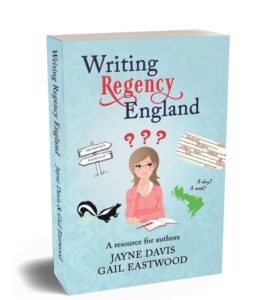Do errors or modern phrases bump you out of a historical story you were enjoying? Or as an author, do you find that despite your best efforts those kinds of errors creep in when you’re not paying attention? Well, if so, here’s good news: Writing Regency England has released! It is the culmination of two years of meticulous hard effort honing and focusing, choosing what to include (the topic could be an encyclopedia unto itself, of course!), writing, re-writing, fact-checking, digging for illustrations–all the work.
 Co-author Jayne Davis and I both love our genre, and we hope this book may serve everyone with any interest in the Regency time and world. We both believe if you’re going to go to the trouble to set a story in a historical time period, creating an authentic sense of that time and world strengthens the story and the experience the reader will gain from reading it. Mistakes can lead to bad reviews, disappointed readers, and an overall bad rep for the genre! WRE is our effort to help fellow authors avoid that fate!
Co-author Jayne Davis and I both love our genre, and we hope this book may serve everyone with any interest in the Regency time and world. We both believe if you’re going to go to the trouble to set a story in a historical time period, creating an authentic sense of that time and world strengthens the story and the experience the reader will gain from reading it. Mistakes can lead to bad reviews, disappointed readers, and an overall bad rep for the genre! WRE is our effort to help fellow authors avoid that fate!
Available in print only, the book offers sixteen chapters of wisdom and information about the Regency time period focused on the “most commonly seen” errors that authors make. Designed as a guide, not a list of complaints, the book covers a wide range, from developing an ear for period appropriate language, avoiding modernisms and Americanisms, to simple facts about the landscapes, flora and fauna of England (no chipmunks! no skunks!), the correct use of titles for characters in the nobility (and who is or isn’t a peer), wisdom about naming your characters plus much more. If you write Regency-set fiction or even just enjoy reading about the period, this is a new resource with a unique slant that you might find invaluable.
https://www.amazon.com/dp/191379010X
Reviewers are giving it 5 stars and saying:
“The authors of Writing Regency England: A Resource for Authors have nailed all the things I grit my teeth over when reading Regency fiction: language that is inappropriate to the period, foods that were not eaten, incorrect use of titles, ignorance of mores and early 19th century life in general. This book covers everything: setting, flora and fauna, building styles, transportation, Great Britain’s old, confusing monetary units (shillings, pence, etc.), professions, the army and navy, and much, much more. I’ve done research for my own books since 2016 and am amazed at the scope of Writing Regency England. I wish I’d had a copy then.”
“If you’ve ever wondered whether what you were reading was accurate or not, then this is the book to tell you. …whether you’re an author or a reader, this book is highly recommended.”
“Thank you to Jayne Davis and Gail Eastwood for putting their heads together to write ‘Writing Regency England’. I do not know how much time I spend going down rabbit holes when I research the period, especially when I am looking for something specific. This book is a great resource for both writers and readers of the period who care about historical accuracy.”
“I’m impressed with the quality of the information and how easy it is to read the book. I’d recommend it highly to historical literature fans, readers and authors alike.”
Every author’s approach to authenticity is as unique as their writing style and voice, but there seemed to be a need for Writing Regency England. Others who write in the same period could certainly have done this book, but Jayne and I were the ones who were crazy enough to tackle it!
Do you think accuracy matters in historical fiction? Please share your thoughts in the comments!

I think accuracy is very important!! It helps one escape the present and enjoy the story being told without being jolted by something “off”. I am looking forward to reading the book!.
Yes, accuracy matters! My pet peeve is using US naming conventions for streets and places – in one novel, the heroine opened a dress shop on the corner of Regent and Bond. Um… no! In the UK, we would always say Regent Street and Bond Street, and those two streets run in parallel. And it’s Buckingham Palace, not Buckingham – drop the Palace and you’re talking about a city in the Midlands. Oh, and tea with cream is a very hard no. //Rant off. Thank you for giving me space to vent 🙂 Thank you for caring, ladies, your efforts are greatly appreciated.
Jenny, thanks for dropping by and venting –your thoughts are welcome! All very good points. Writing WRE was like trying to nail a moving target –new mistakes crop up in books every day!! But I do think if an author followed our advice in the book, errors like those you mention above wouldn’t happen. Consulting maps and reading some period literature just seem basic, don’t they? (sigh)